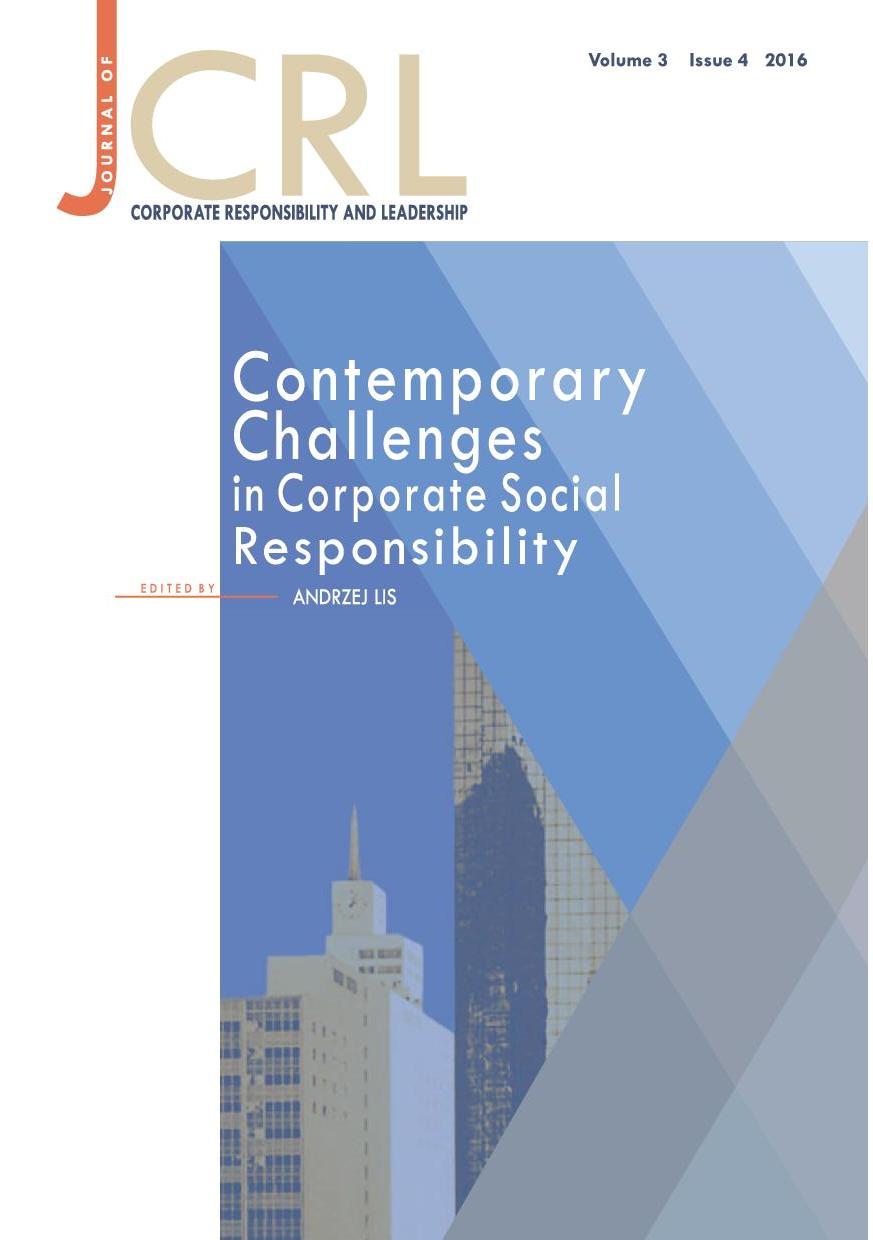Corporate Social Responsibility in the Textile and Apparel Industry: Barriers and Challenges
DOI:
https://doi.org/10.12775/JCRL.2016.024Keywords
CSR, textile industry, apparel industry, management, barriers to CSRAbstract
Corporate social responsibility seems to be becoming crucial in the management strategies of all industries. The paper presents the importance of corporate social responsibility activities in the textile and apparel industry. The textile and apparel industry has been chosen because in many cases the production is being transferred to developing countries. This means that it has a significant influence for the global economy and global management. The main aim of this study is to investigate the barriers and challenges to corporate social responsibility in the textile and apparel industry. The paper analyzes the structure of this industry in the global context and examines areas of the textile and apparel industry such as labour conditions, human and workers’ rights, and environmental issues, each of which is especially sensitive in terms of CSR actions. O n the basis of those social and environmental aspects, there have been recognized barriers and challenges of CSR. The main barrier observed to the introduction of CSR rules in the textile and apparel industry is the lack of the control caused by geographical distance. The paper also shows other obstacles to the implementation of CSR activities and suggests steps that need to be taken to overcome them.
References
Bogunia-Borowska, M., Śleboda, M. (2003), Globalizacja i konsumpcja: Dwa dylematy współczesności, Towarzystwo Autorów i Wydawców Prac Naukowych „Universitas”, Kraków.
Clean Clothes Campaign (2014), Płace w globalnym przemyśle odzieżowym, Retrieved from http://www.cleanclothes.pl/files/files/P%C5%82ace%20w%20globalnym%20przemy%C5%9Ble%20odzie%C5%BCowym%20%E2%80%93%20Deklaracja%20poparcia.pdf (accessed 27 January 2017).
Elementarz Społecznie Odpowiedzialnego Biznesu (2014), Jakie koszty ponosi firma wdrażająca CSR i jakie korzyści może z tego osiągnąć?. Retrieved from http://www.elementarzbiznesu.pl/index.php?option=com_content&view=article&id=403:jakie-koszty-ponosi-firma-wdrazajaca-csr-i-jakie-korzysci-moze-z-tego-osiagnac-2&catid=11&Itemid=247&lang=pl (accessed 01 February 2017).
Frączek, A. (2011), “Public relations jako narzędzie komunikacji społecznej”, Studia Gdańskie: Wizje i rzeczywistość, Vol. 8, pp. 116 – 130.
GUS (2015), Rocznik statystyki międzynarodowej 2015, Zakład Wydawnictw Statystycznych, Warszawa.
ISO (2014), Discovering ISO 26 000: Guidance on Social Responsibility. Retrieved from http://www.iso.org/iso/discovering_iso_26000.pdf (accessed 19 January 2017).
Komisja Europejska (2012), Informator dotyczący zużycia wody “Awake Water Guide”, European Union.
Nowakowski, M.K. (1999), Wprowadzenie do zarządzania międzynarodowego, Difin, Warszawa.
Paliwoda-Matiolańska, A. (2014), “Corporate Social Responsibility in Poland: Is it an Integral Part of Business Process and Opportunity for Value Creation?”, in: Reichel, J. (Ed.), CSR Trends: Beyond Business as Usual, CSR Impact, Łódź, pp. 7 – 28.
PKN (nd), ISO 26000 Guidance on Social Responsibility. Retrieved from http://www.pkn.pl/iso-26000 (accessed 26 January 2017).
Płonka, M. (2013), Ethics in Fashion: CSR in the Garment Industry, mskpu Międzynarodowa Szkoła Kostiumografii i Projektowania Ubioru, Warszawa.
Portal Kupuj Odpowiedzialnie (2010), O bawełnie trochę więcej. Retrieved from http://www.ekonsument.pl/a683_o_bawelnie_troche_wiecej.html (accessed 26 January 2017).
Pracownia Badań Rynków Zagranicznych (2015), Światowy rynek odzieży sięga 1,3 bln USD. Retrieved from http://www.pbrz.pl/artykul/swiatowy-rynek-odziezysiega-13-bln-usd (accessed 25 January 2017).
Rabij, M. (2016), Życie na miarę: Odzieżowe niewolnictwo, WAB, Warszawa.
Rok, B. (2013), Podstawy odpowiedzialności społecznej w zarządzaniu, Wydawnictwo Poltext, Warszawa.
United Nations (1948), Universal Declaration of Human Rights, Paris.
United Nations (2005), TNCs and the Removal of Textiles and Clothing Quotas, New York and Geneva.
United Nations (2016), UNCTAD Handbook of Statistics 2016, New York and Geneva.
Wysokińska, Z., Witkowska, J. (2016), Zrównoważony rozwój: Wybrane aspekty makro- i mikroekonomiczne, Wydawnictwo Uniwersytetu Łódzkiego, Łódź.
Zalejski, J., Faszczewska, K. (2012), “Zachowania polskich konsumentów wobec produktów ekologicznych”, Economy and Management: Quarterly Journal of the Faculty of Management, Vol. 3, No. 4, pp. 92 – 106.
Downloads
Published
How to Cite
Issue
Section
Stats
Number of views and downloads: 3065
Number of citations: 0



